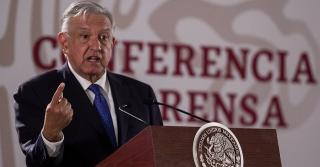Reviving A Sound Approach For Central America

Mexican President Andrés Manuel López Obradorhas suggested a "Marshall Plan" to develop Central America and welcome migrants into Mexico.
If you are old enough to have lived through it or have studied it, do you remember the Marshall Plan? Officially known as the European Recovery Program, the Marshall Plan was a 1948 American initiative to aid post-WWII Western Europe to rebuild their economies through economic assistance from the U.S.
Amounting to about 5 % of the US gross domestic product at the time, the $12 billion in economic assistance (about $125 billion in 2019 USD) was distributed to 16 European countries on a per capita basis with larger amounts given to major industrial powers (Great Britain, France, and West Germany). While results of this four-year program have been debated over the years, the History Channel notes that “by the time of the plan’s last year, economic growth in the countries that had received funds had surpassed pre-war levels. A strong indicator of the program’s positive impact, at least economically.” The political effect was significant as it bonded the relationship between the U.S. and Europe, as well as furthering U.S. interests in the region.
Why bring this up now? USA Today has reported that the day after the inauguration of the new Mexican President, Andres Manuel Lopez Obrador on Dec. 1, 2018, “one of his first acts in office was to sign an agreement with presidents of El Salvador, Guatemala and Honduras, the ‘Northern Triangle’ countries from which the majority of migrants (crossing Mexico’s southern border) originate. The plan outlines a long-term strategy to foster development and strengthen the rule of law in the three nations” with no money for a wall. President Obrador has proposed a plan for $30 billion over five years in job-creating economic development assistance. “A ‘Marshall Plan’ for Central America, as his foreign secretary Marcelo Ebrard, put it.” He was sent to Washington on the same day seeking common ground.
At the time of writing, President Trump has met with the Mexican foreign secretary who indicated that the U.S. president had committed to grant $5.8 billion dollars for institutional reform and economic development in the Northern Triangle. A notice from the Department of State on Dec. 18th 2018 indicated the following:
“The United States is committing $5.8 billion through public and private investment to promote institutional reforms and development in the Northern Triangle. Recognizing the importance of promoting economic growth and opportunities for the people of the region, the Overseas Private Investment Corporation (OPIC) has already invested and mobilized more than $1 billion in the Northern Triangle since 2017 focused on infrastructure, energy, economic growth, and job creation.”
But, according to that same notice, the Administration had only requested $180 million in aid for the region in 2019.
And, the New York Times notes, “Mexico’s new plan is, in many respects, the opposite of Mr. Trump’s vow to crack down on migration, which includes building a wall, deploying the military and cutting aid to Central America.”
China has also expressed interest in financing this program. “’For a long time there has been this competition within Latin America for influence, where China is willing to invest billions in infrastructure and energy that the United States simply isn’t,’ said Duncan Wood, the director of the Mexico Institute at the Wilson Center.
The Mexican strategy to rely on the United States’ concerns about China’s expanding influence in the region reflects a growing sense in Mexico that it can no longer take cooperation with the United States for granted.”
There has been an increasing coverage of this proposal in news sources from New York to Los Angeles with most endorsing this plan in their editorials.
- A new Marshall Plan to ease Central America's agony — and benefit the U.S. Chicago Tribune, November 23, 2018
- Lawmaker calls for Central American "Marshall Plan" after border visit CBS News, November 26, 2018
- Mexico’s Solution to the Border Crisis Consortium News, December 11, 2018
- Mexico pledges $30 billion in development aid in part to deter migration LA Times, Dec. 10, 2018
- U.S., Supporting Mexico’s Plan, Will Invest $5.8 Billion in Central America New York Times, Dec. 18, 2018
- Washington Post: Let's try a Marshall Plan for Central America Omaha, December 18, 2018
- The Face of the Crisis Slate, December 19, 2018
- U.S. should welcome Mexico's bold new steps to help migrants and Central America USA Today, Dec. 19, 2018
- Support Mexican plan for migrant crisis Seattle Times, January 8, 2019
- The facts about the humanitarian crisis in Mexico and Central America Doctors Without Borders, February 5, 2019
It’s not a new idea, as this article from the Obama era and President Obrador’s predecessor indicates, but maybe the timing is right.
Whether or not this materializes remains to be seen. Support and encouragement to your legislators would be very helpful.